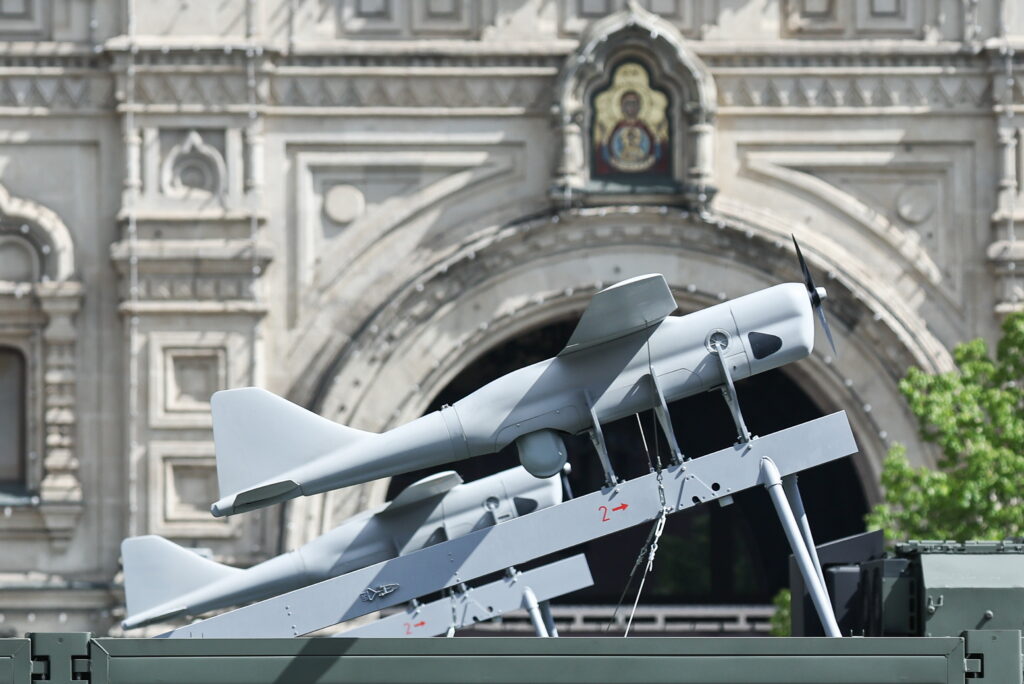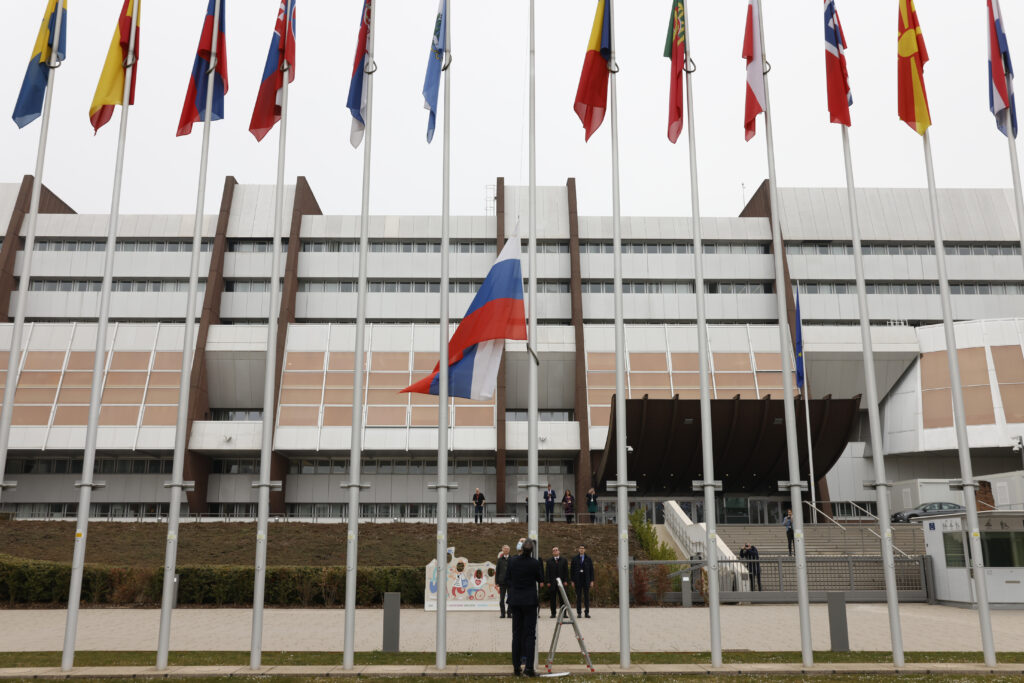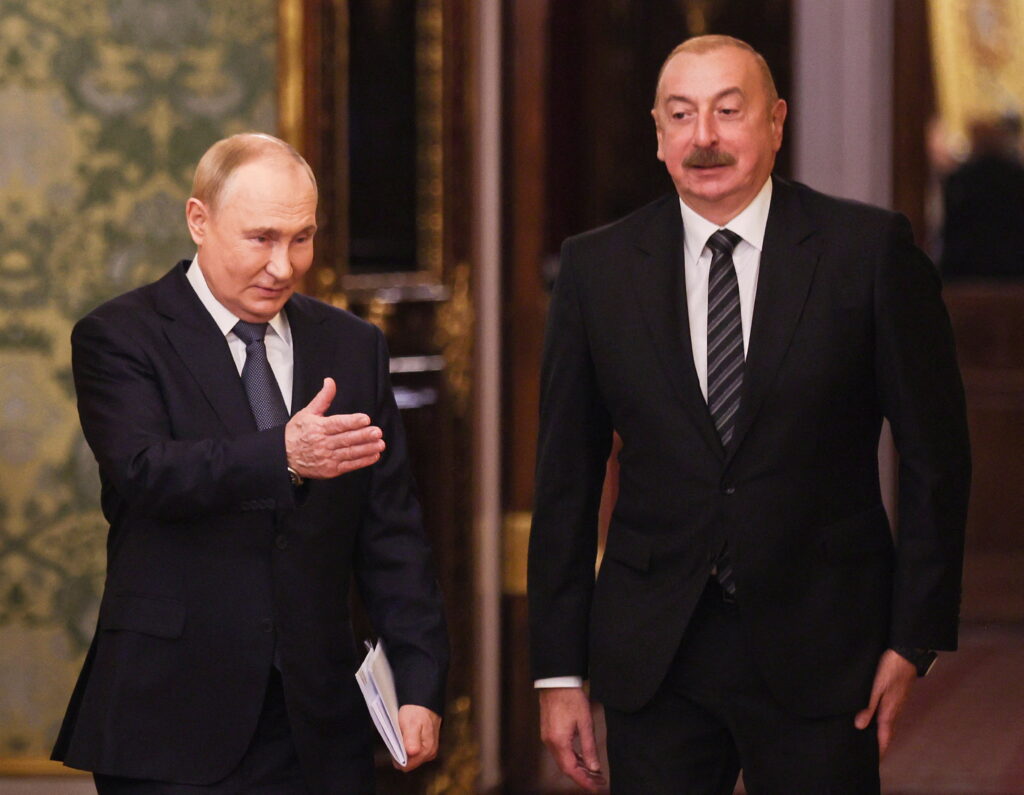Alongside President Vladimir Putin’s wanton decision to launch a major invasion of Ukraine for the second time in eight years, Moscow has re-asserted its threat to the fractured and already volatile balance of the South Caucasus. Just as Putin was launching his war in Ukraine, he flaunted his country’s continued dominance in the South Caucasus by effectively summoning Azeri President Ilham Aliyev to Moscow to sign a new ‘friendship and cooperation’ agreement.
Aliyev declared that the signing of the declaration brings Moscow and Baku’s «relations to the level of an alliance.» His remarks came just hours after Putin recognized his puppet Ukrainian breakaway regimes in Donetsk and Luhansk and as Russia’s forces were preparing to launch their invasion of Ukraine.
Nagorno-Karabakh: Bridges to both sides
Armenia is already also allied to Russia through the Collective Security Treaty Organization (CSTO). So effectively, Russia’s latest treaty with Azerbaijan makes Russia an ally of two of the South Caucasus’ three states — even if those two states are interlocked in their own protracted conflict over Nagorno-Karabakh. It follows on from how at the beginning of this year, in a sign that the CSTO is now more than just paperwork, Armenian Prime Minister Nikol Pashinyan oversaw the formal initiation of the Russian-led CSTO intervention into Kazakhstan, and sent 100 troops to support it.
Previously, Armenia’s Pashinyan and Azerbaijan’s Aliyev had sought a strategic balance between Russia and the West. The former came to power through a 2018 revolution driven by anger at corruption and electoral malfeasance by the former Armenian authorities. Pashinyan was seen as pro-Western. Shortly after coming to power the then-CSTO head, Yuriy Khachaturov, was arrested over his role in Armenia’s 2008 protest crackdowns that had targeted Pashinyan and his allies. Nevertheless, Pashinyan quickly made clear he would not be breaking with Russia or leaving the Eurasian Union. (His predecessors had joined this trading bloc after deciding not to sign a Deep and Comprehensive Free Trade Agreement (DCFTA) with the European Union in 2013, the same issue which played such a role in Ukraine’s own 2013/2014 crisis.)
Pashinyan’s status as a cheerleader for the Russian-led Kazakh intervention can be explained by his country’s disastrous 2020 war with Azerbaijan. In it, Baku retook much of the disputed Nagorno-Karabakh territory. Russia stood by, not invoking the CSTO despite Pashinyan’s request — Nagorno-Karabakh is recognized as de jure Azeri territory by Moscow. Then, Russia swept in to mediate an end to the conflict, deploying ‘peacekeepers’ to the region. That move is serving to expand Russia’s defensive footprint across Armenia, including in the southern Syunik region. This was done at Armenia’s request. After all, the risk of further war with Azerbaijan still looms, with clashes sporadically taking place on the de jure Armenian-Azeri border. So with his Kazakh gambit, Pashinyan may be hoping that in the event of a full-fledged Azeri invasion, he could call on the CSTO to intervene.
It is hard to see how Pashinyan’s potential hope is credible though. Putin has a propensity to only act in ways that benefit his regime. Even so, a refusal to approve of Russia’s decision to intervene in Kazakhstan via the CSTO would have risked undermining the only country offering Yerevan any semblance of a security guarantee. Aliyev will likewise have been motivated to sign the latest agreement due to Russia’s enhanced security role. Indeed, Baku only signed the 2020 ceasefire after Putin summoned both parties to Russia hours after Azerbaijan shot down a Russian helicopter near the Armenia-Azerbaijan border.
The long road to Nakhchivan
Baku will also feel it has gained something from its recent agreement. This explains why Aliyev was willing to do such a pact with Russia just as Putin was set to order a series of war crimes in Ukraine. Baku has insisted Yerevan also uphold pledges to enable passage to its allow transportation to its Nakhchivan territory, exclaved by Armenia, Turkey and Iran.
The two sides agreed to do as much in the 2020 ceasefire agreement; Baku has called for the reconstruction of a Soviet-era rail link that has been broken since the 1988−1994 First Karabakh war. Taking its cue, the latest Russian-Azeri agreement calls on Moscow to support these efforts and ensure the implementation of the 2020 pact. It also says both sides will refrain from economic activity that damages the other and makes a notable mention of upholding territorial integrity, which Putin awkwardly argued Russia was not being facetious about — despite running roughshod over the principle in Ukraine simultaneously.
A wayward West
These gains may primarily be on paper, but the timing of Aliyev’s signing highlights just how absent the West has been from the wider Eurasia region in recent years. There was no meaningful Western intervention or mediation of the 2020 Second Karabkh War. Aliyev’s regime has cooperated with the West on both anti-terror efforts, including with regards to the war in Syria where Washington and Moscow have been on opposite sides, and benefitted from being at the core of the EU’s Southern Gas Corridor strategy to increase non-Russian supplies. But that has not exempted it from substantial criticism over its kleptocracy and lack of democracy. Its oligarchs were also caught in a corruption scandal involving both Donald Trump and the Iranian Revolutionary Guards Corps — little surprise it has withdrawn from Western politics, even as it continues to tap Western oil firms for investment (and, reportedly, bribes). The Biden Administration’s early ham-fisted approach to Eurasia inspired little confidence it would have an alternative. Though fellow NATO member Turkey has played a key role in building up Azerbaijan’s ability to win the 2020 war.
Moscow clearly believes these varying alliances with co-belligerents in the South Caucasus is the best way to protect its regional hegemony. It may use the phrase stability; but as its invasion of Ukraine has demonstrated it is willing to throw even Russian-speaking cities on its border into death and disarray to get its way. It is not only in Azerbaijan and Armenia where this is being observed with concern, but also in Georgia, which suffered gravely as the result of a five day war with Russia in 2008.
Encroaching on Georgia
During that war, Moscow shelled and attacked Gori and Poti, but never made a military move on the capital, Tbilisi, or other population centres like Batumi and Kuitaisi. It withdrew to the territory of its two breakaway statelet proxies, recognizing their independence at the war’s end but subsequently effectively taking full military control even in Abkhazia (which has not sought political integration into Russia, unlike South Ossetia). Russia’s decision to shell Kharkiv, a largely Russian speaking city that is even closer to its own border than Donetsk, has erased any assumptions that Putin was intimidated by the threat of urban resistance in Georgia.
Moscow has been slowly further encroaching on Georgia through its creeping ‘borderization’ ever since the 2008 war. Moscow and Tbilisi still do not have formal diplomatic relations. The war in Ukraine has made even clearer to many Georgians that the threat of renewed Russian war remains.
Many Georgians have previously volunteered to fight in Ukraine, and even as the war rages, more are seeking to do so. This has resulted in a crisis in Georgia-Ukrainian relations as Tbilisi has sought to hinder such flights and also refused to join in the Western-led sanctions regime on Russia, even as traditionally neutral Switzerland and Singapore have done so. But Georgia’s government is genuinely afraid of provoking an expansion of Russia’s war, or brining about renewed Russian trade restrictions that have hobbled its economy previously. Regardless of whether this is the right decision, it is one that has been made in the context of an effective freeze from the West in advancing Georgia’s NATO and EU agendas since it signed its own EU DCFTA Agreement in 2014.
Georgia’s fears will only have been further accentuated by the Azerbaijan agreement, given that Baku is its sole other energy supplier. The new Russian-Azeri agreement in Point 25 includes a pledge to refrain from economic activity that damages the other party, something that Moscow would likely argue includes any increased support for Georgia in the event of a new crisis. Even if they are hostile towards one another, Tbilisi now finds itself surrounded by Moscow and its allies on three of four borders.
Yet on its fourth border, Georgia is buttressed by a NATO member — Turkey. Ankara has in recent years moved closer to Moscow, famously buying its S-400 missile defense system over the US-made Patriot system. Yet the nadir in Ankara and Moscow’s relationship came just in 2015, when the former shot down a Russian jet that strayed into its airspace from Syria. Tensions remain over that conflict, and plenty of others — including Azerbaijan, where Turkey has sought to place its own troops in the aftermath of the 2020 war. Despite all his flaws, President Recep Tayyip Erdogan has managed to make Turkey a rising power even amid economic mismanagement. Yet the West has distanced itself from Ankara, to the point where Turkey’s NATO membership has come under question in recent years, and the EU has famously made no progress on Turkey’s stated ascension intentions for years. Ankara’s rapprochement with Moscow appears to now be at an end, given its closing of the Bosporus to Russian forces and supply of key drone technology to Ukraine’s armed forces. Yet, so far, the West seems unwilling to put aside its own issues with Ankara.
The story of Russia’s invasion of Ukraine is still being written. But it has quietly simultaneously cemented its strategic dominance over the South Caucasus. The West’s response to the Ukrainian crisis has exceeded expectations on the sanctions front and even with regards to direct support for Kyiv. But whether the West will respond in the South Caucasus remains to be seen. Regardless, it should be prepared to acknowledge, and respond to Russia’s increased dominance there, as well its own culpability in enabling this. The West has taken a leave of absence, bringing delays in cementing institutional links, neglect for Turkey’s strategic position, and allowing largely unchecked kleptocracy to fester in countries like Azerbaijan.










